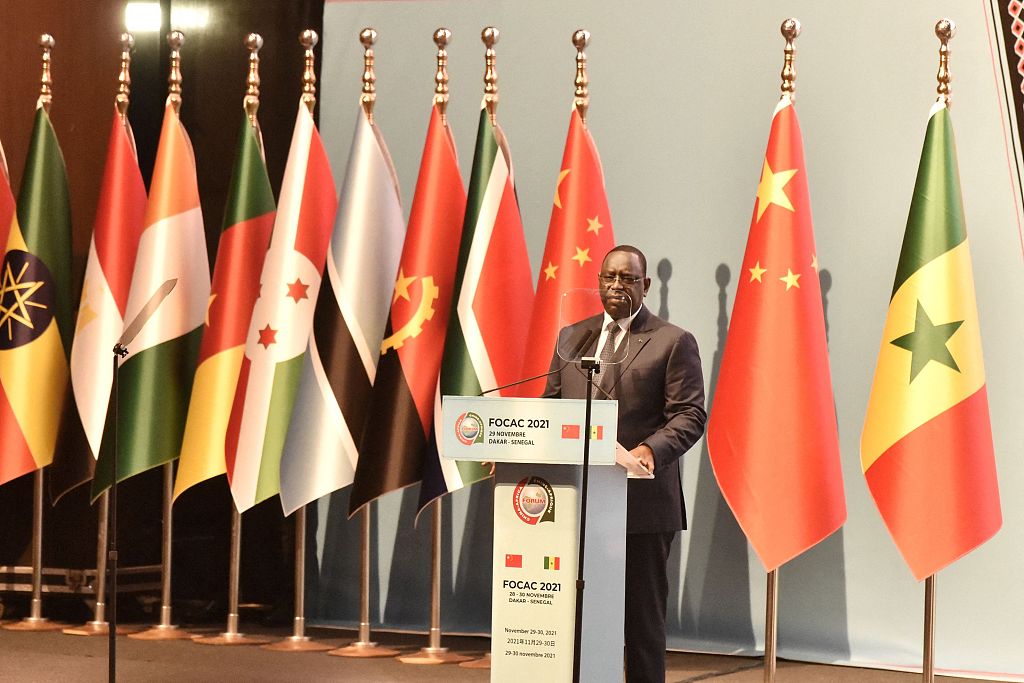
Editor's note: Stephen Ndegwa is a Nairobi-based communication expert, lecturer-scholar at the United States International University-Africa, author and international affairs columnist. The article reflects the author's opinions and not necessarily the views of CGTN.
The just-concluded 35th African Union (AU) Summit held from February 5 to 6 in Ethiopia's capital city Addis Ababa was an event not to be missed by the continent's leaders, and partners as well. It is at this time that Africa's genuine friends stand up to be counted by their messages of goodwill and reassurance.
Who best to lead such partners than Chinese President Xi Jinping who on February 5 sent a congratulatory message to Africa's leaders during the summit. Xi's was a rare gesture taking into account that there are many influential world leaders particularly from the West who see nothing great coming from the continent.
According to the AU, the Assembly is its supreme policy and decision-making organ and comprises heads of state and government of the continental body's member states. It determines the AU's policies, establishes its priorities, adopts its annual program and monitors the implementation of its policies and decisions.
While noting that this year marks the 20th anniversary since the founding of the AU, Xi commended the continental body for upholding its vision and mission, which had translated to strength, unity and development between its member countries. "Such efforts have proven effective in maintaining peace, stability and development in Africa, and have won Africa growing influence and stature in the world," Xi commented.
Now, amid the COVID-19 pandemic, China-Africa relations have solidified as the two partners work toward building a China-Africa community with a shared future in the new era. During the 8th Ministerial Conference of the Forum on China-Africa Cooperation (FOCAC) held in November 2021 in Dakar, Senegal, Xi announced nine programs for cooperation with Africa in the next three years, an initiative unanimously supported by both sides.
The Dakar Action Plan (2022-2024) reflects the revitalized FOCAC which has graduated from the trade and infrastructural staple to a more holistic and strategic partnership. The whole gamut of the areas canvassed at the Dakar conference is all encompassing and includes finance, social development cooperation, medical care and public health, education and human resources, poverty reduction and rural development, science and technology, press and media, cyber security, and maritime cooperation.

Senegalese President Macky Sall delivers his speech during the China-Africa Cooperation meeting at the Diamniadio in Dakar, Senegal, November 29, 2021. /CFP
Senegalese President Macky Sall delivers his speech during the China-Africa Cooperation meeting at the Diamniadio in Dakar, Senegal, November 29, 2021. /CFP
Some would ask the meaning of a "new era" as espoused by China. The concept was first spelled out by President Xi in 2013 during his speech at the Moscow State Institute of International Relations when he talked of mankind as a "community of common destiny." In recent years, the idea has been concretized. It means that no one can survive in this world alone no matter how well endowed; we are all parts of a whole.
In his message to the AU Summit, Xi underscored the four pillars that will drive China-Africa relations: cooperation on the Belt and Road Initiative, the Global Development Initiative (GDI), the AU's Agenda 2063, and the African Continental Free Trade Area. These pillars form the foundation of a strengthened China-Africa partnership, ideally and optimally serving the needs of both partners. Through these platforms, China will channel its resources and catalyze Africa's growth momentum.
The synergy around these pillars will have a wide-ranging socioeconomic impact by mainstreaming Africa in the global economy. To grow, the continent needs efficient and cost-effective channels to export its goods to the global value chains. This will help Africa to be competitive in the global marketplace through value addition of its raw materials.
The GDI, which was proposed by Xi at the 76th session of the United Nations (UN) General Assembly in September, 2021 will also act as a backup for the AU Agenda 2063. The GDI was hailed by the UN Industrial Development Organization as a boon for both South-South and triangular cooperation. Experts see it as China's clever way of ensuring that the onerous burden of assisting developing economies is shared by as many partners as possible globally.
Contrary to Africa's erstwhile major development partners from the West, who isolated potential partners for their selfish ends, China does not seek to monopolize its close relations with the continent. Using the strong foundation laid by the respective public sectors in the last couple of decades, areas of China-Africa cooperation are expanding far and wide as contained in the Dakar Action Plan. Both partners have so much potential to share and the new era of unbridled cooperation will make this possible and successful.
China has inspired Africa with innovation and the art of the possible. The constant technology transfer taking place from Chinese contractors to African firms and projects has made the continent confident that it can start with the basics and grow the technology to suit its development needs.
Ultimately, Xi's message was aimed at reiterating and affirming China's pledge "to steer China-Africa cooperation toward higher-quality and wider-ranging development, and to write a new chapter in China-Africa friendship."
(If you want to contribute and have specific expertise, please contact us at opinions@cgtn.com.)

